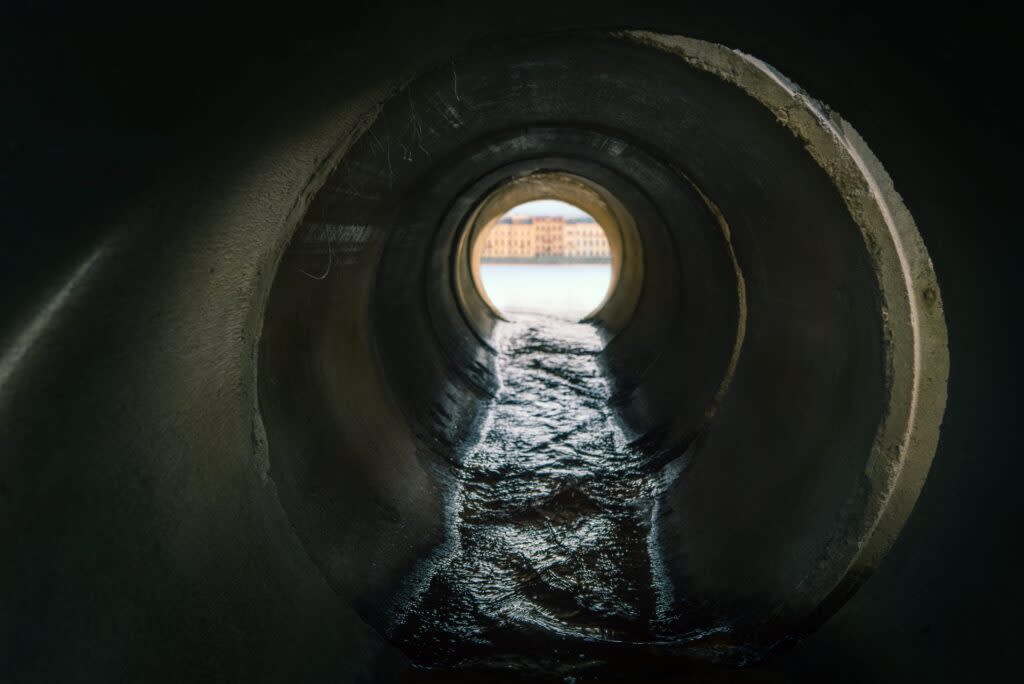Pa. high court will consider benefits vs. higher costs in private ownership of water utilities

(Getty Images)
Pennsylvania’s highest court will consider whether the state should permit private companies to acquire public water and sewer systems even when a deal is likely to increase costs for consumers.
The case involves for-profit water company Aqua PA’s bid to buy a township-owned Chester County sewer system and the price approved by the Pennsylvania Public Utilities Commission (PUC) under a law that is also under legislative scrutiny.
The 2016 law was intended to make the takeover of troubled municipal water and sewer systems more attractive to investor-owned companies like Aqua PA but critics say it has resulted in soaring water and sewer bills for thousands of customers across the state.
“The net impact, the dollar impact, by all these acquisitions in total, is about $100 million a year that ratepayers are paying more than they otherwise would have,” Pennsylvania Consumer Advocate Patrick Cicero told the Capital-Star. “There’s significant harm, financial harm to consumers.”
The Office of Consumer Advocate (OCA), which is an legislatively established independent agency that represents consumers in utility issues, challenged the PUC’s approval of Aqua PA’s proposal to purchase the East Whiteland Township wastewater system in 2022.
A Commonwealth Court panel of three judges agreed with the consumer advocate, finding that the PUC incorrectly found that the benefits of the deal outweighed the harms to the public, namely the potential for higher sewer fees.
The PUC, Aqua PA and East Whiteland Township asked the state Supreme Court to review the decision and on Friday, it issued orders granting their requests. The Supreme Court agreed to consider whether the Commonwealth Court abused its discretion by overruling the PUC’s findings that the sale to Aqua PA would benefit the public, whether the PUC should reject such proposals because consumers’ bills might go up, and to resolve questions about existing case law.
A spokesperson for the PUC said the agency would not comment on pending litigation. A spokesperson said Aqua Pennsylvania is appreciative of the Pennsylvania Supreme Court’s decision to hear this appeal. “We are looking forward to the Court’s final decision and we will make further comment after the legal process is completed.”
Gov. Tom Wolf signed Act 12 to amend Pennsylvania’s public utility law in April 2016. The new law allows municipal water and sewer utilities to negotiate with for-profit utilities for the fair market value rather than the actual value of the system. The higher purchase prices, in turn, give new owners a basis to seek approval to charge higher rates, which they usually receive, consumer advocates testified during a December hearing before the state House Consumer Protection, Technology and Utilities Committee.
Investor-owned companies, such as Aqua PA and Pennsylvania American Water, have purchased 22 municipal utilities under the new valuation method and won rate increases ranging from 44% to 166%, according to the PUC.
A package of bills pending in the House would require utility companies to use lower values for newly purchased water and sewer systems when seeking rate increases, spread the impact over a longer period and improve transparency of the process.
According to the Commonwealth Court’s decision in July 2023, Aqua PA and East Whiteland made an agreement for the sale of the township’s wastewater system for nearly $55 million and applied for PUC approval. The OCA filed a protest to the application.
In a proceeding before an administrative law judge, customers of Aqua PA and the East Whiteland system raised concerns that their rates would go up as a result of the sale.
Aqua PA presented testimony that as a large utility company it was well prepared and had ample resources to take over operation of the East Whiteland system. It also asserted that its ownership would provide other benefits such as better customer service, the ability to spread risk over a larger customer base, and in-house environmental and regulatory experts. It argued that its ownership of the township’s fresh water system would allow it to coordinate projects to avoid service disruptions.
The OCA provided evidence that the price Aqua PA was offering was inflated by more than 64%. Aqua PA calculated that it would need to recover more than $5 million in revenue annually as a result of the sale but agreed to freeze East Whiteland wastewater customers’ rates for three years. After that, rates could increase between 66.5% and 133%, depending on whether the cost was paid only by East Whiteland customers or Aqua PA’s entire customer base. OCA also argued that if the system remained a public entity, customers would benefit from the system not paying taxes and not having shareholders.
The administrative law judge recommended that Aqua PA’s application be denied, but the PUC found that the benefits of the deal outweighed the harm to the public. It granted the application for the purchase, albeit at a slightly reduced price of $54.4 million.
In the OCA’s appeal of the decision, Commonwealth Court President Judge Renee Cohn Jubelirer wrote that the potential benefits of Aqua PA’s technical, financial and operational assistance to the township’s wastewater system were not substantial enough to outweigh the known harms.
(This article was updated at 8:50 a.m., Tuesday, June 18, 2024, to include a statement from Aqua PA.)
The post Pa. high court will consider benefits vs. higher costs in private ownership of water utilities appeared first on Pennsylvania Capital-Star.

